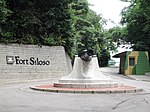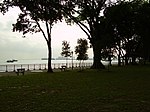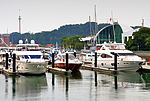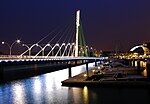Long Ya Men

Long Ya Men (simplified Chinese: 龙牙门; traditional Chinese: 龍牙門; pinyin: lóngyámén; Malay: Batu Berlayar) or Dragon's Teeth Gate, is the name Chinese explorer Wang Dayuan recorded for Batu Belayar, a craggy granite outcrop that formerly stood at the gateway to Keppel Harbour in Singapore. In his description, “The strait runs between the two hills of the Danmaxi (Temasek) natives which looked like dragon’s teeth.” From there, the name Long Ya Men or Dragon Teeth’s Gate was born. The rocky outcrop served as navigational aids to ancient mariners sailing through the swift waters of the narrow channel between them, but was subsequently destroyed by the British in 1848 to widen the channel for larger vessels to sail through. In 2005, a symbolic replica was erected by the Singapore government near its original site to mark the role it played in Singapore's maritime history.Long Ya Men was documented in Wang Dayuan's travelogue Daoyi Zhilüe as one of the two settlements of Temasek. It was marked in the Mao Kun navigational map historical maritime annal Wubei Zhi said to date from the voyages of Ming dynasty's Admiral Zheng He. Long Ya Men in the map was also used to refer to the strait between Sentosa island and Labrador Point, and named after a pinnacle of stone that was called Batu Berlayar, which means "Sail Rock" in Malay. Another suggestion is that it refers to the Singapore Main Strait south of Pulau Satumu. The Long Ya Men's unique features was said to have assisted Zheng He in navigating the waters around Singapore during his seven maritime voyages to the west between 1405 and 1433 AD.
Excerpt from the Wikipedia article Long Ya Men (License: CC BY-SA 3.0, Authors, Images).Long Ya Men
Plaza Tanjung Berlayer,
Geographical coordinates (GPS) Address Nearby Places Show on map
Geographical coordinates (GPS)
| Latitude | Longitude |
|---|---|
| N 1.2625166666667 ° | E 103.80518888889 ° |
Address
Plaza Tanjung Berlayer
Plaza Tanjung Berlayer
, Bukit Merah
Singapore
Open on Google Maps









